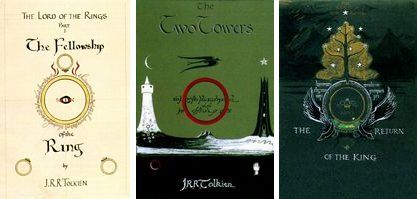Initially I was going to have a separate post for The Fellowship of the Ring, The Two Towers, and The Return of the King but I realized that even if I post two book reviews a week in December I still wouldn't have time to do all of those and everything else. So I'm still going two book reviews a week in December (well, theoretically anyway, going to have some major catching up to do once exams are done) but I did decided to cram all three of these books into one post. Plus, I think that most people think of these books together, not individually anyway and it's a bit hard to say "well I hope they do this" when I've not only heard the stories before but seen the movies. So I guess this makes this review a bit more introspective than normal, oh well!
Lord of the Rings by J.R.R. Tolkien
Summary: Bilbo Baggins is growing old and decides that it's time for him to vanish from Hobbiton and leave most of his worldly possessions to his nephew Frodo including a certain ring. The years begin to pass and their old friend Gandalf makes a startling and scary discovery, Bilbo's ring of invisibility is in fact the long-lost ring of power that belonged to the dark lord Sauron who has slowly been gaining in strength since around when Bilbo was adventuring. So a council is called and they decide that there is only one thing that can be done, to send Frodo along with a company of others into Mordor to destroy the ring rather than risk Sauron finding it again and in an attempt to destroy him forever.
The Good: It was rather interesting to re-read these books since I remembered thinking in the past that you could draw some parallels to the real war that was going on as Tolkien read those but I had forgotten just how brutal the Scouring of the Shire part was (probably because it wasn't in the movies and I saw those marginally more recently than the books) and that made it a lot easier to understand Frodo's fate/choice in the end. Before I had never quite understood why he did what he did but after rereading that part I get it now and I think it also marks very well this end of a mythological third age that the books talk about. And I really liked all of the meta-commentary on the history/timeframe that these books are set in, Tolkien borrowed heavily from Norse mythology for a lot of his setting and since I don't come across that much fiction which does that makes this (in a very odd way) make it feel fresher than a lot of the epic fantasy I've read.
The Bad: I had forgotten this but in the second and third books (when the fellowship is split in two) the entire first half of the book focuses on one group and the second on the other which feels rather disjoined and I'm glad they changed that for the movies. I can see why Tolkien did that but whenever there is a story with a lot of different viewpoints I always prefer quickly switching back and forth between the people/groups rather than seeing how an entire event plays out for one group and then switching over to the other group to see how it went for them. I also wish some things in the setting had been fleshed out more (there was a one-off line about how orcs were inferior copies of either elves or ents which I thought was cool but wasn't ever touched on again) but maybe things like that appeared in some of his other writings later.
On a funny note, starting with the first book the stories kept referencing an appendix and I figured this was part of the whole literary agent hypothesis which the book sometimes indulged in and never went looking for it. That is until I was flipping through the final book to see how many pages were left and realized there was over 100 pages of notes and dates for these things, oops, shall have to find time to read those later on. And I think that after all of this I need to finally make an effort and read the Simarilon especially since I really liked how Tolkien has set up this rather epic (in the classical sense of the word) setting and I'd like to explore more of it.
